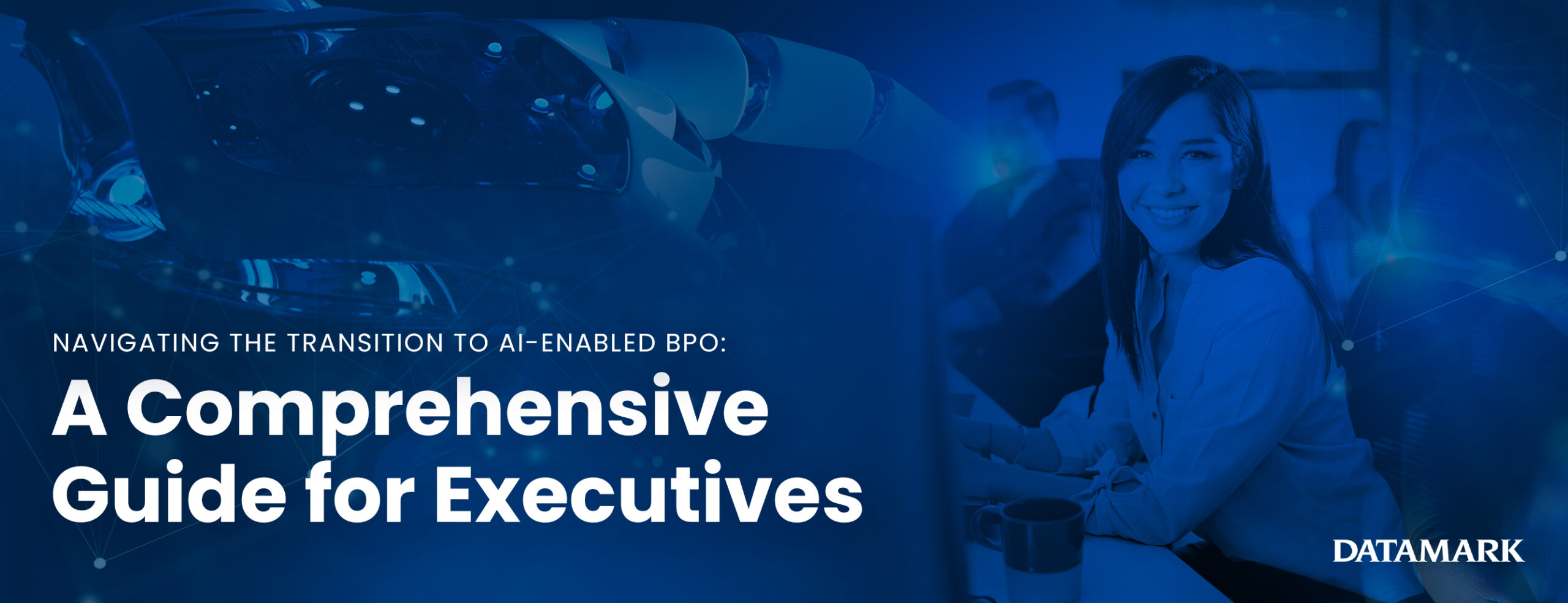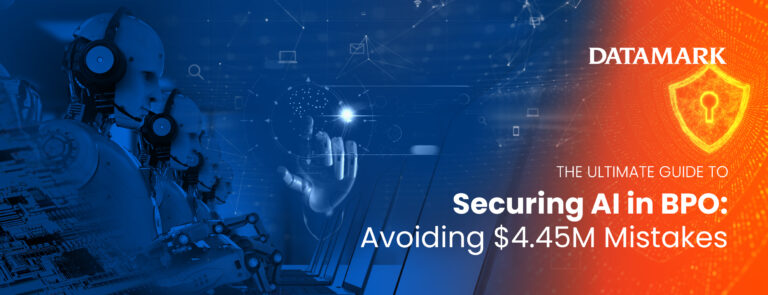
Introduction
Do businesses that ignore AI-driven business process outsourcing (BPO) risk their future? A recent McKinsey survey reveals that 65% of organizations are now regularly using generative AI, nearly double the percentage from ten months prior. For executives, transitioning to AI-enabled BPO isn’t just a competitive advantage—it’s essential for future success.
Traditional BPO models often struggle with high labor costs, operational inefficiencies, and inconsistent customer service quality. According to Deloitte’s Global Outsourcing Survey 2022, 76% of executives indicated that IT services delivered via the service provider ecosystem are crucial for overcoming challenges related to skills and services.
AI-enabled BPO offers a solution by automating repetitive tasks, providing faster and more reliable customer support, and empowering teams to make data-driven decisions. Datamark’s artificial intelligence (AI) tools, such as DataSpark and DataScribe, are designed to bridge these gaps, providing the agility today’s businesses need.
Imagine AI tools that reduce average handling time, enable real-time customer insights, and enhance agent productivity while ensuring data security through Microsoft Azure’s advanced tenant isolation. The potential to improve customer experience, reduce costs, and increase productivity is vast. Executives who embrace AI-enabled BPO see operational improvements and stronger customer loyalty and employee satisfaction.
Ready to explore how AI can modernize your BPO model? Read on to learn about the key benefits, considerations, and tools that make Datamark a leader in AI-driven BPO solutions. If you’re prepared to start your transformation, reach out for a consultation or demo to see these tools in action. Read along!
In This Post:
- Introduction
- Current Cost Challenges in Contact Centers
- Key Cost-Saving Opportunities with AI
- Financial Impact of AI in Contact Centers
- Real-World Examples: The Financial Impact of AI in Action
- Why Datamark’s AI Tools Are the Right Choice
- Embrace AI for Long-Term Cost Efficiency
- Let AI Redefine Your Contact Center Operations
Challenges in Traditional BPO Models
As businesses strive to meet customer expectations and scale, traditional BPO models often reveal their limitations. Here’s a breakdown of these obstacles:
High Costs and Operational Inefficiencies
Traditional BPO relies heavily on labor-intensive tasks, creating bottlenecks in operations. From repetitive data entry to manual report generation, these processes are costly and time-consuming.
Traditional models also demand extensive workforce training and maintenance, further escalating costs. Over time, these inefficiencies lead to lost revenue opportunities and reduced competitive advantage.
Lack of Real-Time Data and Insights
Traditional BPO models are often hindered by data lag, resulting in delayed decision-making. Without real-time access to data, organizations struggle to adapt to fast-changing market conditions.
For executives, this creates a reliance on reactive, rather than proactive, strategies—impacting customer satisfaction and revenue. In an environment where quick responses to customer needs are increasingly important, traditional BPO models fall short.
Inconsistent Customer Service Experiences
Customer service quality can vary significantly in manual, human-dependent BPO models. Research highlights that 43% of customers are less likely to return after a single poor service experience. Service inconsistency not only disrupts brand trust but also erodes long-term loyalty, as customers increasingly expect fast, accurate solutions.
With manual, human-dependent BPO models, customer service quality can vary widely. Service inconsistency can erode brand trust and loyalty over time, especially as modern customers expect fast and accurate solutions.
Unlike traditional BPOs, AI-driven solutions offer standardized responses and ensure customers receive high-quality service regardless of when they contact support.
Why is AI-enabled BPO a Game-Changer?
AI-enabled BPO transforms business processes by addressing the pitfalls of traditional models. Here’s how:
Streamlining Processes Through Automation
AI tools like Datamark’s DataSpark and DataScribe simplify tasks that were once handled manually, improving speed and accuracy. DataSpark enhances agents’ access to essential resources, such as FAQs, SOPs, and compliance documents, significantly reducing time spent searching for information. This streamlined access means that agents can focus more on quality customer interactions.
DataScribe, on the other hand, reduces “after-call work” (ACW) time by summarizing conversations in real time. It allows agents to move on to the next customer faster and with less mental load.
Enhanced Customer Service with AI Bots
AI bots bring significant improvements to customer service, handling common queries instantly. A Gartner study predicts that by 2025, 85% of customer interactions will be automated. Through natural language processing (NLP), AI bots engage customers with customized responses, only escalating complex issues to human agents as needed.
For example, Datamark’s DataSpark offers standardized answers to FAQs, ensuring customers receive prompt, consistent service—regardless of the time or situation.
Data-Driven Decision-Making for Executives
A Bain & Company study reveals a winning edge for data-driven companies—they’re 5% more productive and 6% more profitable than their competitors.
With AI, executives gain insights based on real-time data analytics, enabling informed decision-making. For instance, AI-enabled BPOs can analyze customer interactions to identify trends in service inquiries, which can help businesses preemptively address potential issues.
Moreover, AI-driven tools can assess employee performance metrics, helping executives understand resource allocation needs and manage staff efficiency more effectively.
That’s the power of AI-enabled BPO—efficiency, consistency, and data-backed insights. At Datamark, we take these principles further with cutting-edge tools like DataSpark and DataScribe, designed to simplify operations, enhance customer experiences, and drive smarter decisions.
Datamark’s Suite of AI-Driven Solutions
Datamark stands out with its proprietary AI solutions designed for efficiency, security, and an exceptional user experience. Here’s a look at the tools leading the way in AI-driven BPO:
DataSpark: AI Knowledge Base for Real-Time Agent Support
DataSpark offers a transformative approach to agent support, providing instant answers to questions related to SOPs, FAQs, and other critical documents. This tool reduces the time agents spend finding answers and minimizes the risk of human error in information retrieval. DataSpark ensures that agents can access accurate and secure information promptly by using Microsoft Azure’s secure framework.
DataScribe: Generative AI for Summarized Call Transcriptions
DataScribe addresses the After-Call Work (ACW) challenge by using generative AI to transcribe and summarize calls in real-time. This feature reduces call-handling times and automates data entry, helping businesses save on labor costs while ensuring compliance through automated masking of sensitive data like PII and PCI information. The AI-powered tool is designed for contact center outcomes, helping businesses meet their KPIs without compromising customer experience.
Security and Compliance with Microsoft Azure
Security is paramount for organizations handling sensitive information. Datamark’s partnership with Microsoft Azure ensures data protection with tenant isolation and high encryption standards. Azure’s industry-leading security protocols make Datamark a trusted partner for enterprises prioritizing compliance, especially in heavily regulated industries such as healthcare and finance.
Microsoft Azure’s leading-edge security protocols ensure that customer data is kept separate, secure, and compliant with the strictest industry regulations. This commitment to security builds trust with customers and partners, giving executives peace of mind in a landscape where data breaches and compliance issues are increasingly costly.
Key Considerations for Transitioning to AI-Enabled BPO
Transitioning to AI-enabled BPO requires a strategic approach to ensure that all aspects of your organization are prepared for the change. Here are essential steps to facilitate a smooth transformation:
Assessing Your Current BPO Model
Before embarking on AI adoption, it’s crucial to perform a detailed assessment of your current BPO model. Look at areas where manual processes lead to inefficiencies, such as data entry, documentation, and customer service workflows.
Identifying these areas will help define where AI can provide immediate, measurable value and establish a baseline to assess the effectiveness of AI tools like DataSpark and DataScribe.
Ensuring Compliance and Security
In an era where data privacy concerns are essential, selecting an AI partner that prioritizes compliance is essential. Datamark’s solutions are backed by Microsoft Azure’s industry-leading data protection features, ensuring tenant isolation, encryption, and regulatory compliance.
For enterprises handling customer data, these security measures are not just an added benefit but a requirement that fosters trust and minimizes risk.
Preparing Your Team for the Transition
For a successful transition, it’s not enough to adopt new technology; your team must also be prepared and empowered to use it. Invest in training programs that help employees understand AI processes and optimize the benefits of AI tools.
For instance, training agents to amplify DataSpark’s AI knowledge base will enable faster, more accurate responses to customer queries. This focus on change management will help employees feel confident. It reduces resistance to new technology and boost productivity from day one.
Real-World Examples of AI Refining Customer Service
Several leading companies have effectively harnessed AI to transform their customer service operations, achieving remarkable results:
CVS Health’s AI-Powered Virtual Agent
CVS Health has introduced an AI-powered virtual agent to enhance the customer service experience by replacing traditional menu-based call options. This system allows customers to directly state their needs, with AI providing real-time responses. If the AI cannot address the query, it quickly connects the customer to a live agent.
Additionally, a new app facilitates self-service via voice and text-based AI chatbots, catering to the preferences of younger, tech-savvy customers.
H&M’s Virtual Shopping Assistant
H&M, a renowned retail giant, has been successfully using AI for customer service through its virtual shopping assistant. This AI-powered chatbot assists customers with product information, size, availability, delivery options, refunds, and more.
By engaging users with questions to understand their style preferences and providing personalized outfit suggestions, H&M enhances the shopping experience and drives customer satisfaction.
Decathlon’s Digital Assistant
Decathlon, a leading sporting goods retailer, faced a significant surge in customer inquiries and turned to AI to manage the increased volume.
By implementing a digital assistant capable of understanding over 1,000 unique customer intentions, Decathlon automated 65% of customer inquiries, leading to reduced support costs and improved customer satisfaction.
Success Metrics: How to Measure AI-BPO Impact
Monitoring the success of AI-enabled BPO is crucial to validate its ROI and optimize further. Here are key performance indicators (KPIs) to track:
Operational Efficiency Gains
Use metrics like reduced Average Handling Time (AHT), minimized ACW, and process automation rates to measure efficiency improvements. Compare these metrics against pre-AI benchmarks to assess the effectiveness of AI-enabled automation.
Customer Satisfaction Improvements
Track Net Promoter Score (NPS), Customer Satisfaction (CSAT) scores, and First Contact Resolution (FCR) rates to measure customer experience improvements. AI-powered tools like DataSpark help ensure quick and accurate responses. It contributes to higher customer satisfaction and retention rates.
Employee Productivity and Satisfaction
AI-enabled tools reduce repetitive tasks and improve job satisfaction by allowing agents to focus on more meaningful customer interactions. Monitor employee productivity through metrics like call resolution times and ACW reduction.
AI tools also help minimize burnout by streamlining workflows, providing support, and reducing the mental load of repetitive tasks. This increased efficiency is linked to higher job satisfaction and reduced turnover.
Embracing the Future with AI-Driven BPO Solutions
AI-enabled BPO is not just a trend—it’s a strategic imperative for businesses looking to enhance operational resilience, customer satisfaction, and employee productivity.
Datamark’s AI solutions, such as DataSpark and DataScribe, offer powerful tools to automate repetitive tasks, secure sensitive data, and provide executives with actionable insights. Backed by Microsoft Azure’s security framework, these solutions make it easier for companies to stay competitive while meeting compliance standards.
The future belongs to businesses that embrace AI to drive new levels of productivity, responsiveness, and customer satisfaction. As a trusted partner in the BPO landscape, Datamark can guide you through a seamless transition to AI-powered operations.
Explore Datamark’s AI-Driven Solutions Today
Ready to take the next step in improving your BPO operations? Schedule a consultation or request a demo to experience how Datamark’s AI solutions can elevate your business. Explore firsthand how AI solutions like DataSpark and DataScribe can elevate your business from customer service excellence to operational efficiency.
Let us help you achieve a new standard of performance with solutions that are efficient, secure, and designed to keep you ahead in a competitive market.




